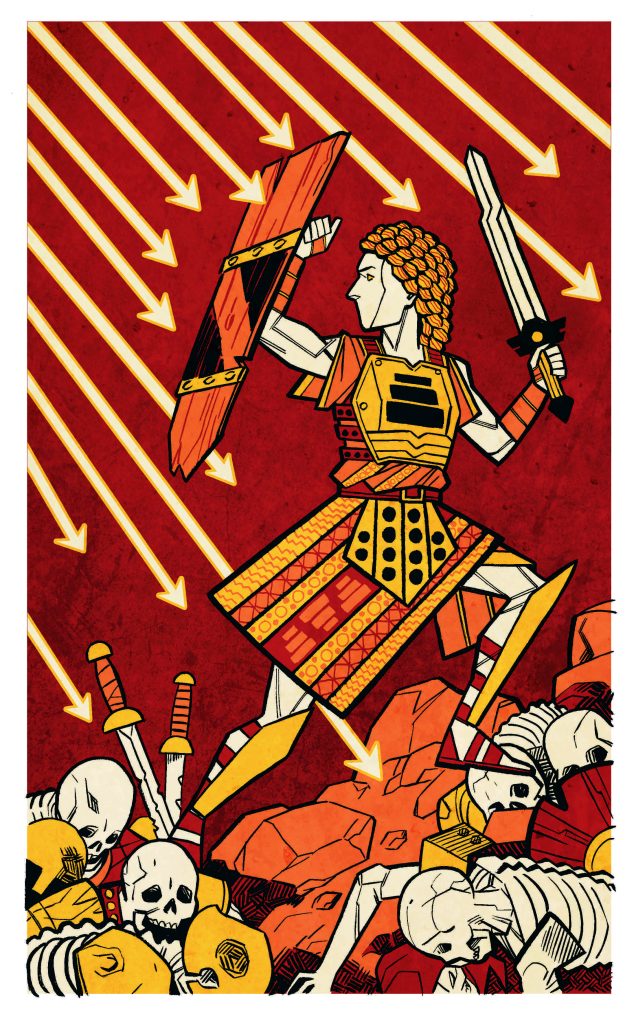
When battle is joined, Dol Dorn gives you the courage to stand your ground and the strength to swing your sword. But it’s Dol Arrah who calls you to the battlefield and who gives you the reason to fight—Dol Arrah who urges you to stand up to injustice and to smite the wicked. Dol Dorn gives you strength, but Dol Arrah gives you wisdom; Dol Arrah tells you when to fight and how to use your strength wisely and justly. If you cannot hear Dol Arrah’s voice when your hand falls to your blade—think twice about whether you should draw it.
On my Patreon, I’ve been asked what makes being a follower of Dol Arrah interesting? Why would I want to play a character devoted to her rather than to the Silver Flame? There’s considerably more canon material on the Church of the Silver Flame than there is on the Sovereign of Sun and Sacrifice; even Tira Miron abandoned her vassal roots to embrace the Silver Flame. It was templars of the Flame who stood against the hungry horde in the Silver Crusade. We have a clear picture of what it means to be a paladin devoted to the Silver Flame. Why choose Dol Arrah instead?
Despite their surface similarities, Dol Arrah and the Silver Flame are very different. The role of a divine champion of Dol Arrah has little in common with that of a templar of the Silver Flame. Both will team up to slay a vampire, certainly; but beyond that, their outlook and general duties are quite different. The keyword of the Silver Flame is defense. It is a force that defends the innocent from evil, and primarily from supernatural evil; it binds the overlords and empowers those who fight undead and fiends, but takes no side in mundane politics or wars between mortal nations. By contrast, Dol Arrah is a Sovereign of war. Along with Dol Dorn and the Mockery she is present on every battlefield and every soldier hopes that she sees their cause as just. The Silver Flame protects humanity from evil; Dol Arrah guides those who fight for justice with honor, regardless of who or what they are fighting. At the same time, Dol Arrah is the patron of diplomats: part of wisdom in war is knowing when a battle can be avoided.
If you’re playing a character devoted to Dol Arrah, remember that she doesn’t exist in isolation; she’s part of the Sovereign Host, an interconnected pantheon whose members govern different situations. Dol Arrah may urge you to fight for justice, but it’s Onatar who puts steel in your hand and Dol Dorn who gives you the strength to swing it; for that matter, it’s Aureon’s laws that establish the nature of justice. By saying that you’re “a servant of Dol Arrah” what you’re saying is that you have a special connection to Dol Arrah that’s stronger than that of most people—that she has called you to service and charged you to fight in her name. But you should still honor ALL of the Sovereigns in their place and time, and you may color your spells as coming from any of the Sovereigns when appropriate. When you issue a command, you speak with Aureon’s voice. When you use find steed you are calling on Balinor, and when you cast bless you might ask Olladra for good fortune. The Sovereigns are united; you may be a champion of Dol Arrah, but you’re still a Vassal of the Sovereign Host. Beyond, part of your duty is to embody the values of Dol Arrah: to stand up for justice, to spread light, and to inspire others to act with honor and wisdom. This comes to the point that unlike a templar of the Silver Flame, it’s not your daily duty to hunt down the undead—but when you encounter a supernatural threat, you should call down the light of the Warrior Sun.
WHAT’S YOUR WAR?
While there are chivalric orders specifically devoted to Dol Arrah, she doesn’t have a large standing force like the templars of the Silver Flame, because in the Vassal view ALL soldiers are guided by Dol Arrah. When someone is called out as a servant of Dol Arrah, there is a purpose to the power that she grants. Her divine champions aren’t generally charged to wander around looking for random injustice; when she calls a paladin or cleric, it’s because there is a battle they must fight. There’s a specific injustice that must be addressed, an enemy that must be defeated, a war that only you can win. So, what is it? Let’s consider a few possibilities.
- You must defeat Breggan, the bandit queen of the Black Crown Company.
- You must overthrow Mika Stoneface and help Prince Someone claim the Cloudreaver Principality.
- You must help the Boromar Clan defeat Dassk, or vice versa
- You must drive the Tairnadal from Valenar.
- You must defeat the Order of the Emerald Claw and destroy Lady Illmarrow.
- You must reunite the Eldeen Reaches and Aundair.
- You must restore the nation of Cyre.
These cover a wide range of options. The first few are very regional; Breggan Blackcrown operates on the Western Frontier, and few people outside of the Lhazaar Principalities have even heard of the Cloudreaver Principality. On the other hand, a quest to restore Cyre or to to destroy Lady Illmarrow is a more abstracted struggle whose battles could be fought across Khorvaire. The idea of Dol Arrah supporting the Boromar Clan or Daask may seem strange, but remember that Dol Arrah is present in every battle; if she commands a champion to take a side, it’s because she has declared the cause to be just and because she expects her champion to MAKE it a just and to fight with honor. She may order her paladin to fight alongside the Boromar Clan, but that doesn’t mean they should embrace the treacherous tactics the Boromars might be used to; on the contrary, the idea would be that the champion should inspire the Boromars to be better, to show them how to win their war with honor.
This isn’t a decision one person—player or DM—should make alone. Player and DM should work together to decide both the nature of the character’s war and how important it will be to the campaign. An Arrah champion’s war is the reason they’re adventuring and why they possess divine power. The character believes that they are receiving guidance from Dol Arrah—missions that lead them in pursuit of victory. But is each adventure a clear battle in the war? Or are most adventures just about honing the champion’s skills or acquiring allies? The champion should spread their light wherever they are, fighting with honor and pursuing justice—if they encounter a pack of ghouls in the graveyard, they should deal with them. But they should still have the sense that they are pursuing their war—that if they aren’t clearly fighting the enemy, they are doing something to sharpen their skills or their blade. As a DM, one of the key things I would work on is figuring out how to fit the other player characters into the war. You don’t want one character to have a driving, overarching goal that no one else cares about. If you’ve got a Arrah paladin destined to restore Cyre, than I’d either want the other PCs to have their own ties to Cyre or to have skills the champion clearly needs; part of the paladins’ mission is to convince the bard that they should use their diplomatic skills to help achieve the goal of a new Cyre. Likewise, keep in mind that not all of these wars can be won with steel; the goal mentions above is to REUNITE Aundair and the Eldeen Reaches, and this is a war that will require insight and diplomacy.
WISDOM IN WAR
Dol Dorn is the Sovereign of strength and courage, the patron of the common soldier. Dol Dorn gives you the strength to fight; Dol Arrah gives you a reason to fight, and shows you how to use your strength wisely. She’s the patron of paladins, but also of generals, strategists, and diplomats. As a champion of Dol Arrah, your role isn’t just to fight well; it is to inspire others, to lead in battle and to show them how to fight with honor. The Mockery shows the quickest path to victory, even if it comes with a brutal cost; Dol Arrah shows her champions how to win without compromising their morals, even if it requires risk or sacrifice. And again, Dol Arrah guides mediators and diplomats who prevent unnecessary bloodshed.
So where a paladin of the Silver Flame defends, a paladin of Dol Arrah needs to inspire—to lead others into battle and to inspire them to fight with honor. For a paladin, Oath of Devotion is an easy option, but the Oath of Glory is another clear choice; the Inspiring Smite reflects the rallying power of Dol Arrah. At the same time, the Oath of Vengeance can also work if you are emphasizing the active aggression of the mission—the drive to defeat the enemy rather than to defend the innocent. However, this quest for victory should never come before honor or justice… unless, of course, your champion actually serves all Three Faces of War instead of just Dol Arrah!
For clerics, War, Life, and Light are all possible domains. War and Life both reflect a champion who will fight in the vanguard, inspiring allies and getting the wounded back on their feet. The Light domain reflects Dol Arrah’s role as the Warrior Sun; the cleric should still seek out the battlefield, but they can stay behind the vanguard, inspiring and exhorting them while striking enemies with the sun’s wrath.
In either case, Martial Adept—or a few levels of Battlemaster fighter—is an excellent way to convey the martial nature of Dol Arrah and to make the champion feel like a leader. Commander’s Strike, Commanding Presence, and Maneuvering Strike are all ways to reflect the idea of the Arrah champion as a leader and strategist who relies on wisdom over brute force. Persuasion and Insight are both important skills for a champion who seeks to resolve battles without bloodshed, and Commanding Presence also helps with Persuasion!
A DIVINE MISSION?
I’m suggesting that a champion of Dol Arrah should have a divine mission, that the Sovereign has called them to service to fight a war. How does this fit with the distant nature of the divine in Eberron? The Sovereigns don’t manifest physically in Eberron. People can still have dreams or visions of them; the point is that a skeptic can say how do you know your dream wasn’t just a dream… or even the work of a night hag or quori? And the simple fact is that there’s no easy way TO know; it’s a matter of faith. But in general, Vassals believe that the Sovereigns speak to them through instinct and intuition. The champion may simply know what their mission is with an absolute certainty, that they realize things, or see signs they can’t quite explain in everyday events… when they hear the name Mika Rockface they simply know it is their destiny to bring her down. An intermediary step is what I describe in this article: the idea that the champion receives visions but that they aren’t entirely clear. When they see Mika Rockface, they see a bloody sword hanging over her; when they see the player character destined to become prince, they see a crown floating over their head. The champion is in touch with a divine power, but it’s not something that can be questioned. Another intermediary step is to give the champion a celestial intermediary, as often happens with spells such as commune. The champion has visions of a mighty warrior in red dragonscale armor; at some point in the future they will discover this is actually a Shavaran angel who serves Honor-In-War, who feels compelled to guide them through their mission.
With a broad mission—restore Cyre—the war may last the entire campaign and never actually be won; it’s what drives the champion, but it’s not actually within the scope of the campaign. On the other hand, with a small, narrow war it’s possible the champion will win their war well before the campaign is over. In this case, the player and the DM must decide how to proceed. Does the champion receive a new, even greater mission? Or are they allowed to rest… in which case, the paladin could potentially be redesigned as a fighter, laying down both their divine powers and obligations?
That’s all for now. In conclusion, in playing a champion of Dol Arrah, consider the war you’ve been charged to fight; the manner in which you receive your divine guidance; your broader devotion to the Sovereign Host; and in general, your duty to fight with honor and inspire others to do the same. Happy holidays, and thanks to my Patreon supporters for asking this question and for making these articles possible!


